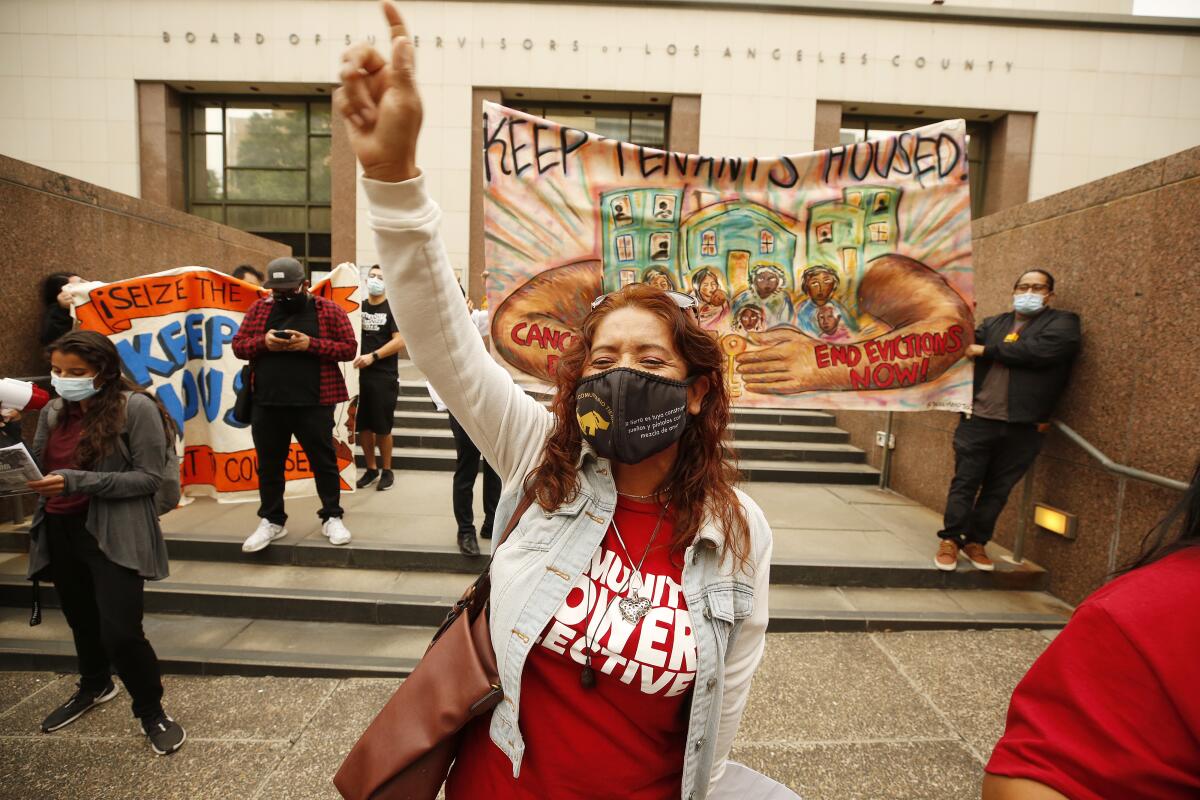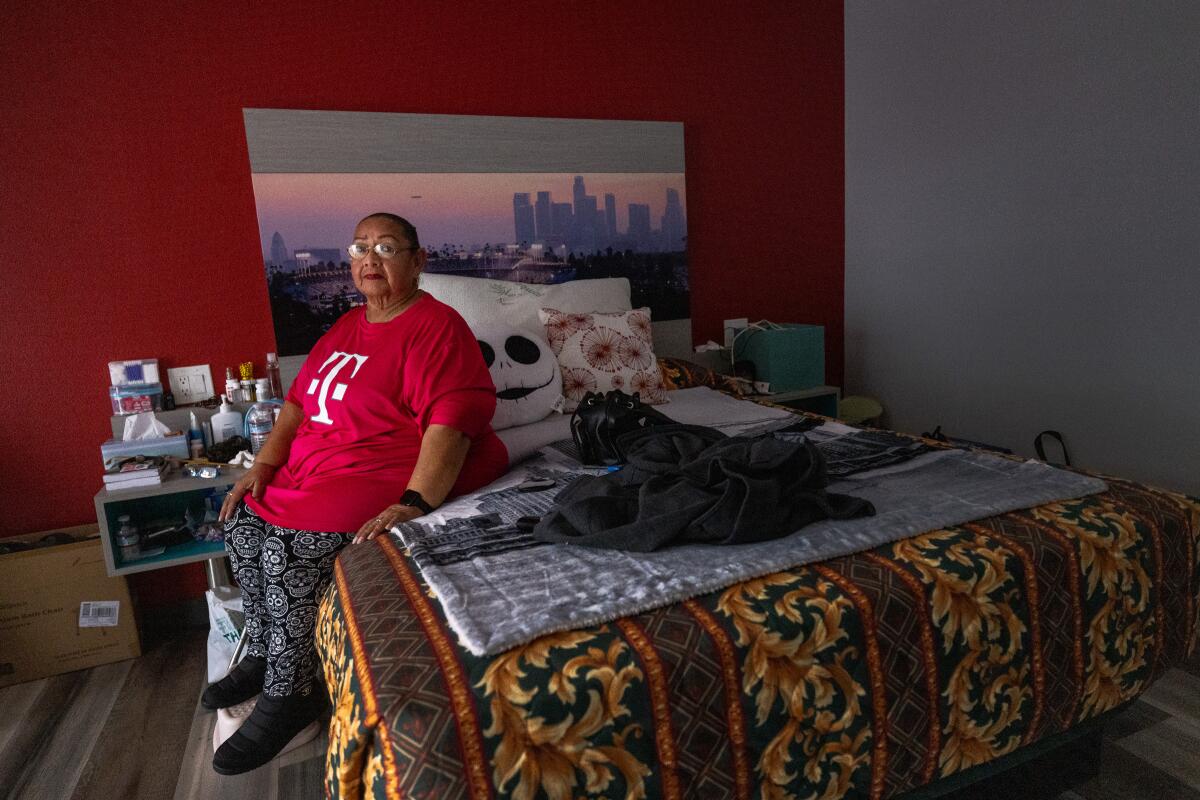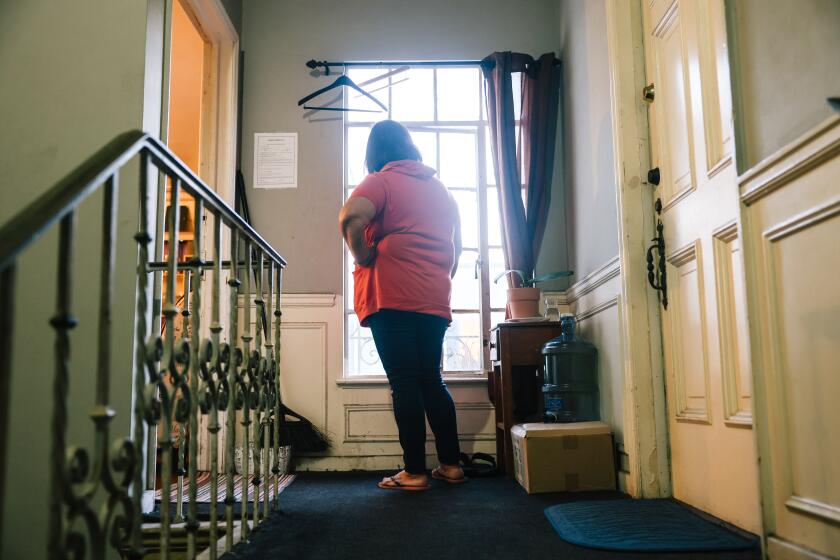L.A. eviction cases rose significantly this year. But it’s not all bad news for renters

- Share via
The eviction courtrooms on the sixth floor of the Stanley Mosk Courthouse downtown were bustling this month, as they have been all year. In one, a woman and her children said they were fighting to hold on to their $750-per-month rent-stabilized apartment near SoFi Stadium, worried that their housing costs could triple if they had to leave. In another, an elderly woman facing eviction was accompanied by her son-in-law, who was also, separately, being evicted from his home.
Eviction cases across Los Angeles County increased by thousands in 2023 after the expiration of pandemic-era moratoriums early in the year. There were about 43,000 eviction filings through November, putting the county on track to end the year with more than 46,000, according to court data compiled by Kyle Nelson, senior policy and research analyst for the nonprofit advocacy group Strategic Actions for a Just Economy.
That’s at least 10,000 more cases than last year and more than any year since 2016. It’s also far beyond 2020 and 2021, when filings dropped precipitously amid the moratoriums that made it more difficult for landlords to evict tenants.
But this year’s numbers, while high, did not soar as much as some tenant advocates had feared. The exact reasons are unclear, but experts and advocates say that permanent tenant protections adopted as the moratoriums expired — such as a Los Angeles city rule that prohibits landlords from evicting tenants for owing less than one month’s fair market rent — may be stemming the tide.
A Times investigation has found that many of the AIDS Healthcare Foundation’s more than 1,300 residents live in squalid conditions, with dozens under the threat of eviction.
Even though the numbers are lower than expected, Nelson said, they still represent tens of thousands of tenants facing eviction every year and are likely to remain elevated for some time.
“We have a lot of work to do if the goal is to keep tenants housed,” he said.
Landlord advocates say the eviction process has become so onerous that they try to find other ways to get tenants to leave.
“For the most part, the owners I speak to are trying to work things out with their tenants outside of court,” said Daniel Yukelson, executive director of the Apartment Assn. of Greater Los Angeles. “Sometimes that entails offering the tenant some money, either in the form of forgiven rent or some cash, just as an incentive to move out rather than go through a prolonged court process.
“If you talk to most rental property owners, they’re extremely frustrated about being in the business,” he added.
This was a year of rapid — and sometimes confusing — change for tenants and landlords. The city and county’s pandemic-era eviction moratoriums expired in the early months of the year, meaning tenants were required to pay rent, even if they were financially affected by COVID-19.
At the same time, the city adopted new tenant protections, including expanding “just cause” rules that require landlords to have a legal reason to evict a tenant. The city also ushered in a major change when it adopted the rule requiring that tenants owe an amount exceeding one month’s fair market rent before they can be evicted. Currently, that is about $2,000 for a one-bedroom apartment.
The Apartment Assn. of Greater Los Angeles has challenged that and other recently adopted protections in court, and the cases are pending.
The rule hasn’t stopped landlords from threatening eviction for amounts below the fair market limit. Data published by the city controller’s office showed that 11,461 eviction notices were filed for an amount of rent below the threshold. Those notices are a precursor to an eviction lawsuit, but it’s unclear how many of those cases end up in court.
As L.A. deals with a housing crisis, new data show how the threat of eviction affects not only poor communities but middle- and high-income ones too.
Another major change for tenants since the pandemic has been Stay Housed L.A., a collaboration among the city, county, and local community and legal service providers, which has significantly increased the availability of legal advice and services for renters facing eviction. The program provided full legal services to tenants in more than 2,000 cases this year and limited services in about 5,200 cases, said Elana Eden, spokeswoman for Legal Aid Foundation of Los Angeles. But there’s still a large gap between the number of cases filed in court and the number of tenants who are able to access legal help.
For those who can’t get a lawyer, some groups are providing other forms of help. The nonprofit Eviction Defense Network launched a “Tenant Empowerment Program,” for tenants who can’t get a lawyer. It offers classes and other support for tenants to better represent themselves in court.
City officials are also working to address the gap in access to legal help — this month, the City Council requested that the city attorney draft a “right to counsel” ordinance that would provide qualifying tenants with legal representation in eviction cases. But even finding lawyers to do the work is a challenge, advocates said.
The Ellis Act has allowed thousands of L.A.’s rent-stabilized units to be taken off the market. A mother and son who fought back want others to know they can too.
“Our reality is there are not enough attorneys,” said Pamela Agustin, coalition director for Eastside LEADS, one of the community groups that partners with Stay Housed L.A. “We are doing this work to prevent homelessness, to keep families in our communities, to stop displacement. But it is happening.”

Maria Briones’ landlord tried multiple times over a period of several months to evict her from the South L.A. apartment she shared with her brother. Briones, 68, who is disabled, had lived in the tiny apartment for about 10 years and paid $525 a month.
The threat of losing her home in a housing market that is so expensive took a toll, she said.
“Sometimes I just felt like running away,” she said. “But where would I go? There was nowhere to go.”
Briones got luckier than many tenants when she secured a lawyer to help her with her case. Kaimi Wenger, supervising attorney for the Tenant Defense Project at Inner City Law Center, managed to get the eviction cases thrown out of court because they were incorrectly filed.
In the end, however, Briones still ended up losing the home after she complained to the city about the conditions of her apartment, including not having power. Inspectors found that it was an illegal and unsafe unit, and in September Briones and her brother were given 10 days to vacate.
She found herself homeless. For a while she stayed on couches in the homes of friends and family, until city officials helped place her in a motel room not far from her old apartment.
She’s living there now, in a room she keeps neat and spare. She is able to store a small amount of food on a desk — some oatmeal, peanut butter and jelly and beans. But for the most part, when she wants to eat, she goes to a friend’s house nearby.
She’s grateful for the security of a private room but knows it can’t be forever.
“I’m not on the street,” she said. “But it’s kind of nerve-racking when it comes to the future. If they can’t get me a permanent place, what is going to happen?”
More to Read
Sign up for Essential California
The most important California stories and recommendations in your inbox every morning.
You may occasionally receive promotional content from the Los Angeles Times.

















